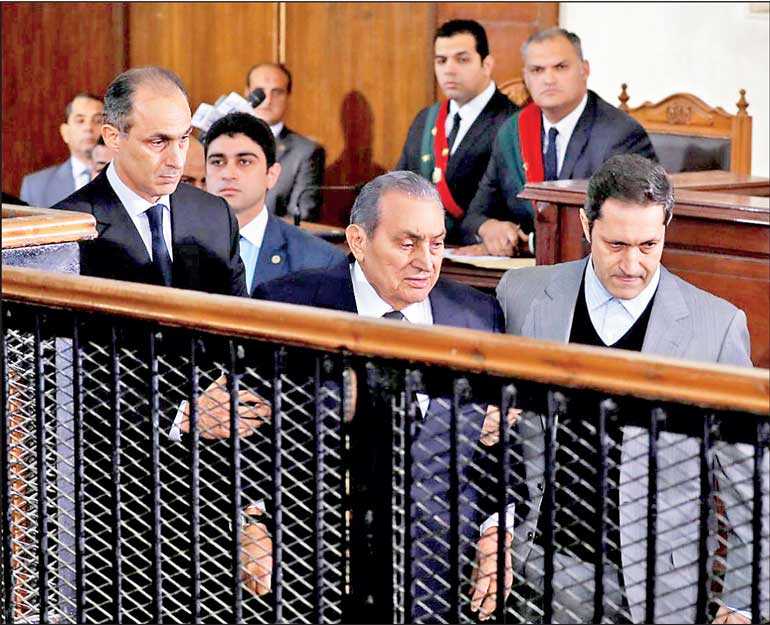Monday Feb 23, 2026
Monday Feb 23, 2026
Friday, 28 December 2018 00:00 - - {{hitsCtrl.values.hits}}

CAIRO (Reuters): Two protagonists of Egypt’s recent history faced each other in court on Wednesday, with toppled strongman Hosni Mubarak testifying for the first time against the Muslim Brotherhood’s jailed former President, Mohammed Mursi.
Mubarak, 90, gave evidence for an hour and a half at the high-security prison complex in southern Cairo where Mursi is detained. Wearing a dark suit and using a walking stick, he was escorted into the courtroom by his two sons.
Mursi was dressed in prison overalls and seated in a thick glass and metal cage running down one side of the courtroom, like other senior figures of the Brotherhood who are defendants in the case.
About 30 relatives, mostly women, stood up to mouth and signal messages to the defendants at the beginning and end of the court session.
The hearing was part of a retrial in which Mursi and others are accused of orchestrating prison breaks and breaches of Egypt’s eastern border during the uprising that forced Mubarak from power in February 2011.
A visibly frail Mubarak, who was given a chair at the witness stand due to his age, was asked dozens of questions by the judge about security developments as the uprising against his 30-year rule gathered pace.
Speaking in a gravelly voice that gradually became stronger, he at times appeared impatient, saying he had no information or details.
Quizzed on alleged infiltration by foreign militants, he said his head of general intelligence had told him on 29 January 2011 of hundreds of people crossing Egypt’s border from the Gaza Strip to support the Brotherhood.
“He told me that there are armed groups which have infiltrated the borders with great numbers, around 800 people,” he told the court. But he declined to answer questions on the role of militant groups, so as not to discuss state secrets without authorisation. “I want permission to speak about this, I am requesting permission so as not to commit an offence,” he said.
Mubarak was himself jailed for six years following the revolution, appearing bed-bound in a courtroom cage and receiving a life prison term for conspiring to kill demonstrators. He was freed after the final charges against him were dropped in March last year.
Mursi, democratically elected after the revolution, has been in prison since being overthrown a year later by Abdel Fattah al-Sisi, then chief of the armed forces and now Egypt’s president.
After Mursi was ousted, Egypt cracked down on the Brotherhood, its oldest and most organised Islamist movement, throwing thousands of its supporters in jail and labelling the group a terrorist organisation. The Brotherhood says it is committed to peaceful activism.
Mursi is already serving sentences totalling 45 years after being convicted in separate cases of spying for Qatar and on charges arising from the killing of protesters in 2012.
He was initially sentenced to death in the prison break case and handed a life sentence on charges of spying for Palestinian Islamist group Hamas, but those verdicts were overturned.
Defendants’ relatives said they saw little hope of seeing justice.
“The court is farcical and the case is farcical,” said one, who asked not to be named.
As Mursi and Mubarak met in court, Sisi, who was re-elected to his second term as president in March, was inaugurating a large housing project in the coastal city of Alexandria.